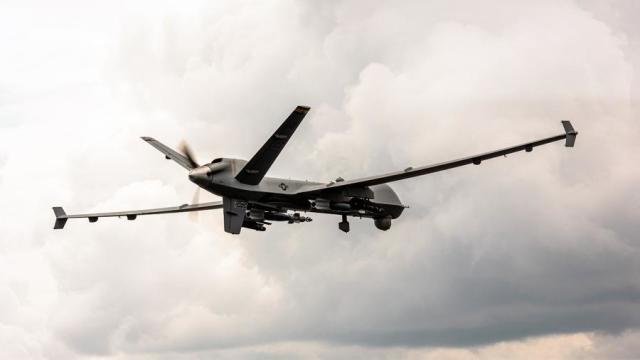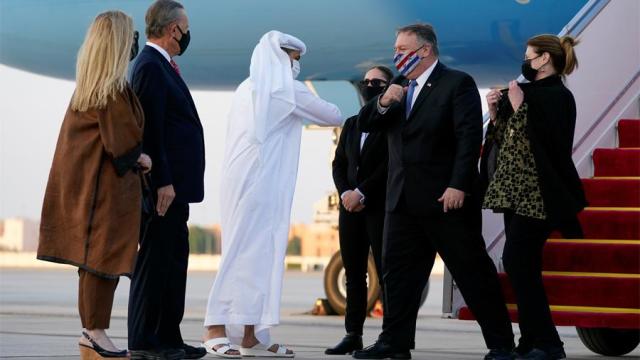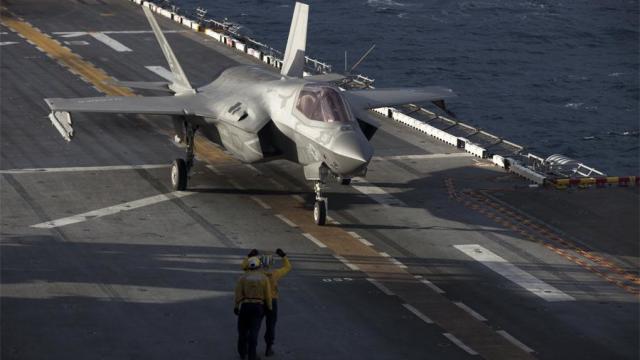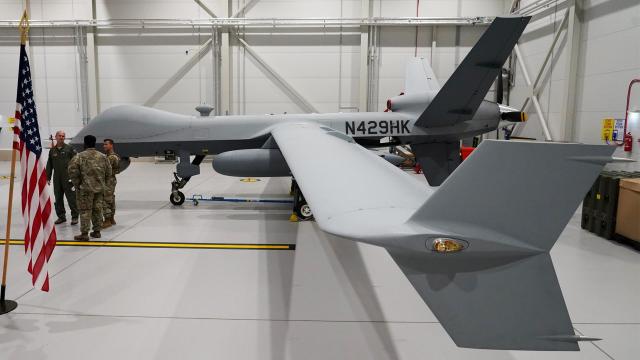The white house expects to conclude a deal with Abu Dhabi for a record amount
Several senators and a member of the us house of representatives have attempted to suspend a $23 billion deal initiated by the administration of President Donald trump to supply the United Arab Emirates with advanced weapons. The delivery should include, in particular, f-35 fighter-bombers and Reaper attack drones. According to lawmakers, the transfer of these weapons will weaken Israel's position and generally ignite an arms race in the middle East — a region where powerful new weapons have rarely helped to establish an atmosphere of peace and calm. Whether Capitol hill will be able to stop the deal between the US and the UAE and what prospects for other suppliers may appear in the event of a breakdown of agreements — in the material "Izvestia".
Protecting Israel's interests
The weakening of Israel's position and the possible spurring of an arms race in the middle East-these are the main arguments used by three us senators, announcing their intention to freeze the plans of the administration of President Donald trump to sell the United Arab Emirates a batch of modern weapons worth $23 billion. The corresponding bills were developed by Democrats Bob Menendez (he is the highest-ranking representative of the party on the armed services Committee) and Chris Murphy, as well as Republican Rand Paul, who opposes interference in the Affairs of other States in matters of foreign policy, writes Politico. The initiatives they prepared were submitted to the upper house about a week after the US state Department notified Congress of plans to supply arms to the UAE.
Senators, in particular, argue that the White house bypassed the standard Protocol for making deals on the sale of weapons to foreign countries, which provides for lawmakers to study the deal. They said the administration also did not respond to their questions about how it plans to respond to "specific national security risks that arise from the proposed deal." A similar package of measures designed to prevent the deal from being implemented was introduced in the lower house of Congress by Minnesota lawmaker Ilhan Omar.

Us military drone MQ-9 Reaper
Image source: Photo: TASS/ZUMA Wire/Lealan Buehrer
In accordance with the terms of the agreement, the UAE should receive 50 f-35 Lightning II fighter-bombers (the country should become the first Arab state to be armed with "lightning", and the second in the middle East — after Israel). In addition, the contract provides for the supply of 18 Reaper attack unmanned aerial vehicles and more than 14 thousand units of missile and bomb weapons. The delivery of UAVs is the second largest shipment in the history of the United States, which is intended for a single recipient country.
"I have already tried to warn the trump administration that trying to circumvent deliberative procedures on an issue that involves a large supply of weapons to a country located in a troubled region with many ongoing conflicts is absolutely irresponsible," Senator Menendez said in a statement. — There are a number of unanswered concerns, including how these shipments will affect the national security interests of both the United States and Israel." According to the lawmaker, Congress needs to intervene and " prevent a new arms race in the middle East."
The US as complicit in war crimes?
The opinion of Menendez, a veteran of American politics who has worked on Capitol hill for more than a quarter of a century, will be difficult to ignore. In addition, his position may become even more significant at the beginning of next year — in January, Georgia will hold a second round of elections for both members of the Senate, and if the Democrats currently in the upper house are in the minority, the now opposition party will get a majority there, and Menendez — the post of Chairman of the international Committee.
In turn, Senator Chris Murphy stressed that although he supports the normalization of relations between the UAE and Israel, the relevant agreement does not contain any us obligations to "flood the region with more weapons." "The United Arab Emirates is an important security partner, but their recent behavior suggests that these weapons may be used in violation of American laws and international law," the Connecticut lawmaker said. According to him, the current contract, "so significant in its scope and its consequences, should not be implemented in the fading days of the outgoing presidential team, and Congress should take measures to stop this dangerous transfer of weapons."

Photo: REUTERS/Patrick Semansky/Pool
Image source: iz.ru
International human rights organizations also opposed the arms deal. "The unprecedented fact that the US government continues to provide support by supplying weapons that risk increasing the catastrophic number of Yemeni civilians illegally killed and injured in attacks using US — made weapons should deeply shock any resident of this country," said Philip Nazif, head of the Middle East and North Africa division at Amnesty International USA. — The United States must resolutely refrain from supplying weapons that could be used in a conflict and not transfer weapons to the UAE, or else be prepared to be complicit in war crimes committed in Yemen."
Despite the fact that American lawmakers in the context of the deal with the UAE were concerned, in particular, about the security of Israel, tel Aviv officially stated that they have no objections to the supplies. In any case, Prime Minister Benjamin Netanyahu said at the end of last month that the topic of Washington's sale of weapons to Riyadh was raised only after the historic Pact between the UAE and Israel was concluded at the White house in September. According to the head of government, the Israeli delegation held talks at the Pentagon and agreed to the deal, receiving assurances that the United States will continue to guarantee Israel's military superiority in the region, AP writes.
Waiting for the new President
The deal on the supply of weapons to Abu Dhabi is an unofficial but obvious result of the agreements concluded earlier by the UAE and Israel on the normalization of relations. President trump, while working on this agreement, said, in particular, that if the consultations were successful, he would have no more problems giving the go-ahead for the transfer of weapons to this Gulf state.
Given the position of lawmakers, the deal with the UAE may face — for now, however, rather theoretically-cancellation or at least delay. The understandable concern of the Emirati side, apparently, was intended to respond to the visit that US Secretary of state Mike Pompeo paid to Abu Dhabi at the end of last week. There, he met with the crown Prince of Abu Dhabi, Deputy commander-in-chief of the UAE armed forces Mohammed bin Zayed al Nahyan and Foreign Minister Sheikh Abdullah bin Zayed al Nahyan.

US Secretary of state Mike Pompeo arrives in the United Arab Emirates, November 20, 2020
Image source: Photo: REUTERS/Patrick Semansky/Pool
In any case, the United Arab Emirates remains the largest us ally in the middle East, along with Israel and Saudi Arabia. In particular, the parties discussed the normalization of relations between the UAE and Israel, as well as the significance of this agreement for "the beginning of a new stage in relations and cooperation between the countries of the Middle East", its role in efforts to "consolidate security, peace, stability and prosperity" for all residents of the region, writes the Saudi Gazette.
The question of whether lawmakers in the United States will be able to prevent the implementation of the deal with the UAE remains open. "The Senate foreign relations Committee and the house foreign Affairs Committee have the right to study arms sales and try to block them," Reuters recalls in this regard. "In the past, measures aimed at suspending arms sales due to concerns about possible casualties in Yemen passed through the Senate and house of representatives with bipartisan support, but failed to get enough Republican approval to override trump's veto of the bans." According to the law, the deal will be considered approved if, within 30 days from the date of receipt of the state Department notification, both houses of Congress do not pass a resolution prohibiting deliveries by a majority vote sufficient to invalidate the President's veto, CNBC said.
In addition, such transactions (even if the agreement with the UAE is approved by the us Congress) from the moment of signing the contract to delivery sometimes take more than one or two years. In this regard, it is absolutely possible that it will be canceled by the future us administration headed by Democrat Joe Biden, the obvious winner of the November presidential election, the results of which were delayed due to the recount of votes in a number of States. "Several advisers to President-elect Joseph Biden are skeptical about the sale of weapons to the Gulf countries because of the devastating Saudi-led war in Yemen, which has already killed thousands of civilians," writes the New York Times.
"If the sale of the F-35 is canceled, there are possible options»
According to the newspaper, the supply of weapons to the UAE, primarily F-35S, " may change the military balance in the middle East, as a result of which small but influential Emirates will be able to demonstrate a more serious force in the region of sectarian rivalry and slow-moving proxy wars." At the same time, some experts do not believe that the new weapons that Abu Dhabi can get will greatly adjust the balance of power.
For example, as Ilya Kramnik, an expert of the Russian Council on international Affairs, notes, in the current situation, the war of the Arab countries of the Persian Gulf with Israel is not real. "All the movements on the topic of preserving Israel's guaranteed military superiority were invented primarily for Syria and Egypt back in the 1970s, although the level was maintained according to the bar of the leading Gulf countries," he notes. — On the one hand, it was beneficial to the Israeli lobby, on the other — to the arms sellers, because you can always offer Israel something even more modern, then deliver something modern to the Arabs and thus maintain a constant level of sales. Over the past 10 years, the United States has been actively pumping the Gulf countries with a large number of very modern structures."

F-35B Lightning II fighter-bomber
Image source: Photo: Global Look Press/U.S. Department of Defense
As for the transfer of the same f-35 to the UAE, there are at least two key points. "The first question is how much their combat training will grow and, in principle, can improve, whether they can master this modern technique at the proper level," Kramnik says. "Judging by the success of the Arab coalition in Yemen, there are big questions about their preparation in this part: Yemenis still manage to carry ballistic missiles on the roads in broad daylight, and then successfully launch them." In addition, there are questions about the organization of the armed forces of the Gulf States and their effectiveness in General. The second point is the question of the political possibility of a conflict between the Gulf States and Israel without the consent of the United States, he adds.
At the same time, if the United States refuses the deal with the UAE, certain prospects open up for the Russian defense industry. The possibility of delivering modern Russian fighter jets to Abu Dhabi has been discussed more than once in recent years. "The Emirates will not shoot themselves in the foot, exposing themselves to us sanctions: it would be suspicious to buy su-35S out of the blue, "the INF expert suggested in an interview with Izvestia. — But in the conditions when the Americans suddenly cancel the sale of the F-35 or greatly delay it, there are possible options. The Arabs will have the right to compensation."
If we assume that the UAE wants to buy new Russian fighters, then Washington's introduction of sanctions will be difficult — the Americans still need an ally against Iran, and "the Emirates, due to their geographical location, are an absolutely necessary element of the coalition in this regard." In addition, the sanctions would be "an additional insult" to the UAE, Kramnik believes: it would turn out that the US first does not transfer them modern weapons that they promised to sell, "and then they would also be punished for trying to buy weapons from the Russians."
Kirill Senin

